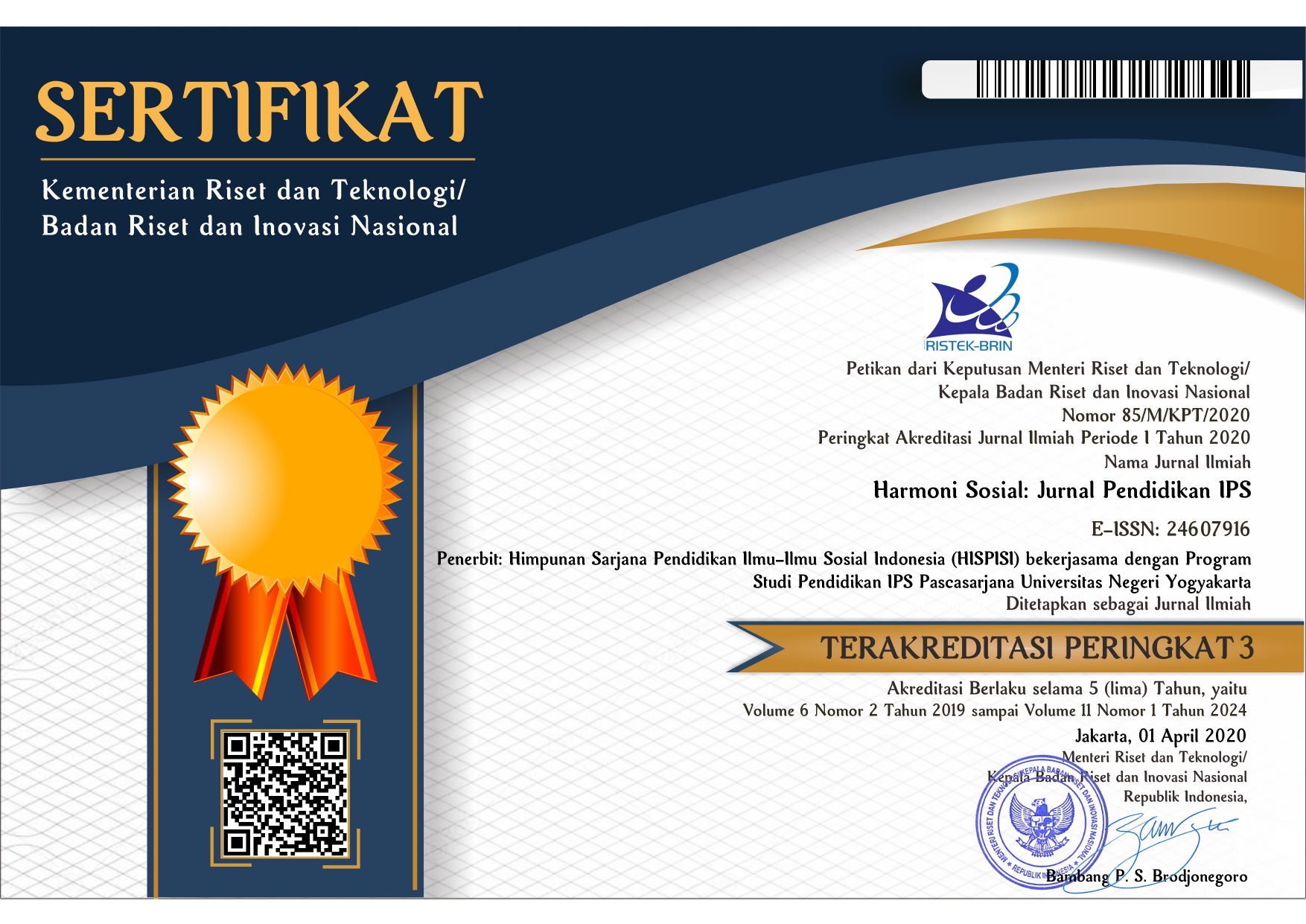Internalization of green social work values in the Climate Village Program in Ujungalang Village Cilacap Regency
Abstract
Keywords
Full Text:
PDFReferences
Adger, W. N., & Barnett, J. (2009). Four reasons for concern about adaptation to climate change. Environment and Planning A: Economy and Space, 41(12), 2800–2805. https://doi.org/10.1068/a42244
Affandi, M. L. A., Din, A. H. M., & Rasib, A. W. (2022). A short review on causes of sea level rise for climate monitoring. IOP Conference Series: Earth and Environmental Science, 1051(1), 012003. https://doi.org/10.1088/1755-1315/1051/1/012003
Amri, S. N., & Arifin, T. (2016). Adaptation strategy of seaweed cultivation to face the climate change (case study in Segoro Anakan Bay Ngadirojo, Pacitan). Forum Geografi, 30(1), 34–44. https://doi.org/10.23917/forgeo.v30i1.1114
Asadnabizadeh, M. (2023). Critical findings of the sixth assessment report (AR6) of working Group I of the intergovernmental panel on climate change (IPCC) for global climate change policymaking a summary for policymakers (SPM) analysis. International Journal of Climate Change Strategies and Management, 15(5), 652–670. https://doi.org/10.1108/IJCCSM-04-2022-0049
Banks, S. (2001). Ethical dilemmas for the social professions: work in progress with social education students in Europe. European Journal of Social Education, 1, 1–16. https://durham-repository.worktribe.com/output/1585549
Creswell, J. W. (2013). Research design qualitative, quantitative, and mixed method approaches (p. 273). SAGE Publications.
Creswell, J. W., & Clark, V. L. P. (2017). Designing and conducting mixed methods research (3rd ed.). SAGE Publications, Inc.
Cumby, T. (2016). Climate change and social work: Our roles and barriers to action [Wilfrid Laurier University]. https://scholars.wlu.ca/etd/1828/
Dominelli, L. (2018). The Routledge handbook of green social work (L. Dominelli, B. R. Nikku, & H. B. Ku (eds.)). Routledge. https://doi.org/10.4324/9781315183213
Dominelli, L., & Ku, H. (2017). Green social work and its implications for social development in China. China Journal of Social Work, 10(1), 3–22. https://doi.org/10.1080/17525098.2017.1300338
Donaldson, C. (2010). Here comes the sun (And the rain, wind and snow). Perspectives in Public Health, 130(1), 10–11. https://doi.org/10.1177/17579139101300010401
Erickson, C. L. (2011). Environmental degradation and preservation. In Handbook of International Social WorkHuman Rights, Development, and the Global Profession (pp. 184–189). Oxford University Press. https://doi.org/10.1093/acprof:oso/9780195333619.003.0027
Huda, M. (2009). Pekerjaan sosial & kesejahteraan sosial: Sebuah pengantar. Pustaka Pelajar.
Kemp, S. P., Palinkas, L. A., Marleen Wong, Wagner, K., Mason, L. R., Chi, I., Nurius, P., Floersch, J., & Rechkemmer, A. (2015). Strengthening the social response to the human impacts of environmental change (5; Grand Challenge: Create Social Responses to a Changing Environment). https://volweb.utk.edu/~envchange/wp-content/uploads/2018/03/Strengthening-the-Social-Response-to-the-Human-Impacts-of-Environmental-Change.pdf
Keraf, S., & Imam, R. H. (1998). Etika bisnis. Kanisius. http://repo.iain-tulungagung.ac.id/9831/5/BAB II.pdf
Ramdani, J. (2020). Intervensi komunitas berbasis green social work. Jurnal Obor Penmas: Pendidikan Luar Sekolah, 3(2), 270–277. https://doi.org/10.32832/oborpenmas.v3i2.3611
Reamer, F. G. (2018). Social work values and ethics (5th ed.). Columbia University Press.
Shokane, A. L. (2019). Social work assessment of climate change : Case of disasters in greater Tzaneen municipality. Jàmbá: Journal of Disaster Risk Studies, 11(3), 1–7. https://journals.co.za/doi/abs/10.4102/jamba.v11i3.710
Sulastri, E., Haryadi, T., & Inayah, E. (2019). Tingkat kesadaran ekologis masyarakat kampung laut, Kabupaten Cilacap, Jawa Tengah. Jurnal Kawistara, 9(1), 78–90. https://doi.org/10.22146/kawistara.31484
Supriatin, L. S., & Martono, M. (2016). Impacts of climate change (El Nino, La Nina, and Sea Level) on the coastal area of Cilacap Regency. Forum Geografi, 30(2), 106–111. https://doi.org/10.23917/forgeo.v30i2.2449
Susandi, A., Herlianti, I., Tamamadin, M., & Nurlela, I. (2008). Dampak perubahan iklim terhadap ketinggian muka laut di wilayah Banjarmasin. Jurnal Ekonomi Lingkungan, 12(2). https://agustincapriati.com/wp-content/uploads/2015/08/Dampak-Perubahan-Iklim-Terhadap-Ketinggian-Muka-Laut-Banjarmasin.pdf
Tasse, A. (2013). International Association of Schools of Social Work (IASSW). In Encyclopedia of Social Work. NASW Press and Oxford University Press. https://doi.org/10.1093/acrefore/9780199975839.013.201
DOI: https://doi.org/10.21831/hsjpi.v9i1.49823
Refbacks
- There are currently no refbacks.
Copyright (c) 2022 Harmoni Sosial: Jurnal Pendidikan IPS

This work is licensed under a Creative Commons Attribution-ShareAlike 4.0 International License.
Our journal indexed by:
Printed ISSN (p-ISSN): 2356-1807 | Online ISSN (e-ISSN): 2460-7916
 This work is licensed under a Creative Commons Attribution-ShareAlike 4.0
This work is licensed under a Creative Commons Attribution-ShareAlike 4.0



















